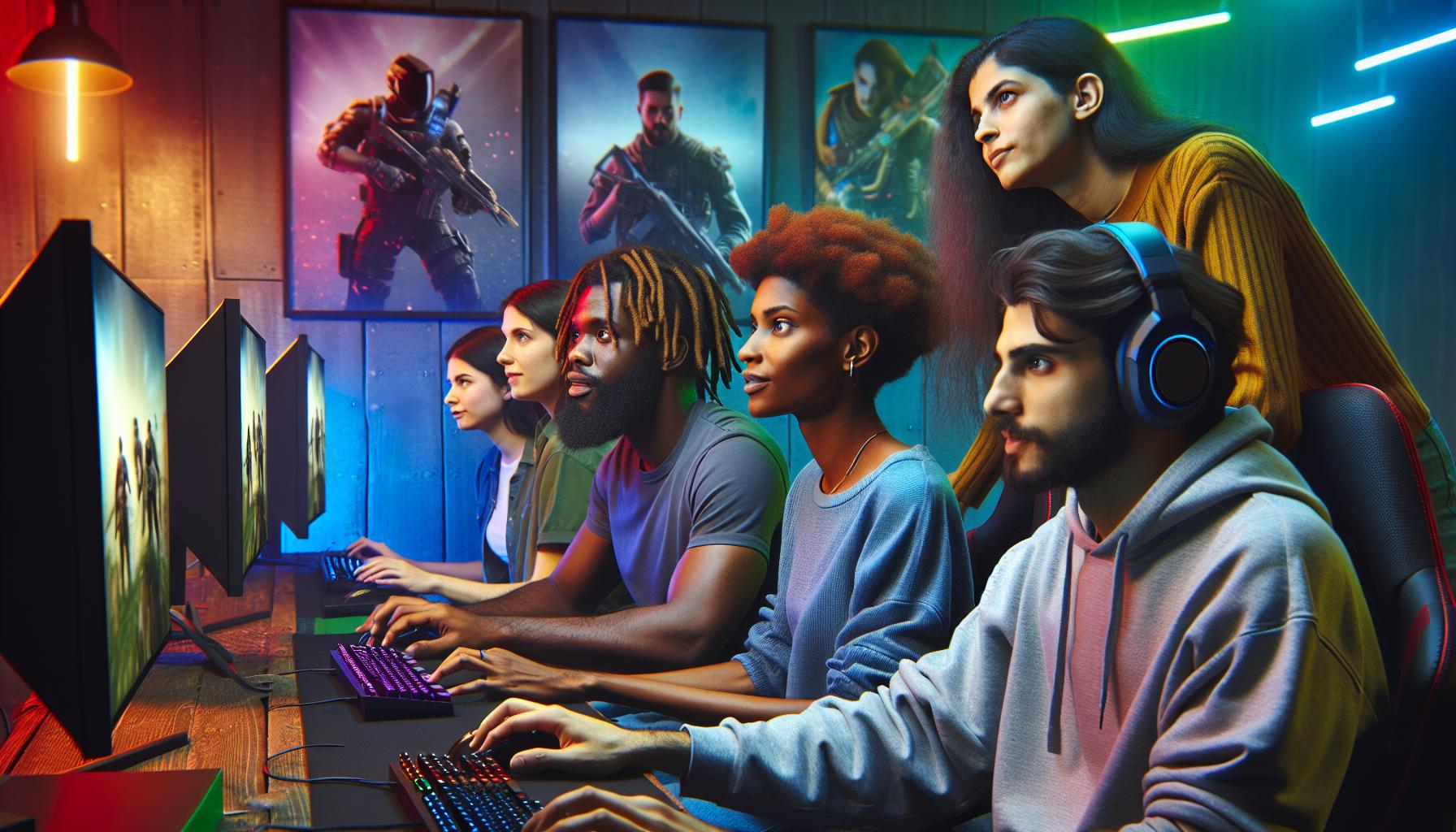The gaming universe has exploded into a vibrant realm where creativity knows no bounds. From sprawling open worlds to intricate storylines, it captivates millions and shapes culture in unprecedented ways. Gamers immerse themselves in diverse experiences that offer not just entertainment but also a sense of community and belonging.
As technology advances, the gaming landscape evolves, introducing new genres and platforms that push the limits of imagination. Virtual reality, esports, and indie games are just a few facets of this dynamic universe, each contributing to its rich tapestry. Understanding this ever-expanding world reveals not only the artistry behind the games but also the impact they have on society and individuals alike.
Key Takeaways
- The gaming universe has evolved into a rich ecosystem blending artistry, technology, and community interaction, offering diverse genres and immersive experiences.
- Technological advancements, including 3D graphics, online multiplayer capabilities, and VR/AR, have significantly transformed player engagement and the overall gaming experience.
- Major gaming genres, such as action/adventure, role-playing, and simulation/strategy, cater to different player preferences while fostering deep emotional connections and critical thinking skills.
- Gaming promotes social connections by bridging geographical gaps and cultivating communities through multiplayer platforms and esports events.
- Educational benefits of gaming include enhancing problem-solving skills, critical thinking, and practical knowledge retention, making it a valuable tool in learning environments.
- Future trends like cloud gaming and the continued integration of VR/AR technologies are set to further expand accessibility and revolutionize gameplay experiences in the gaming universe.
Gaming Universe
The gaming universe represents a vast ecosystem that combines artistry, technology, and community interaction. This digital space includes various genres like action, adventure, role-playing, and simulations, each offering unique experiences. Players engage in immersive worlds, often developing emotional connections with characters and storylines.
Technology advancements play a crucial role in the evolution of gaming. High-definition graphics, augmented reality, and innovative gameplay mechanics enhance user experiences. Platforms such as PCs, consoles, and mobile devices provide diverse access points, enabling millions to participate in gaming.
Online multiplayer platforms foster global communities, allowing players to connect, collaborate, and compete across geographical boundaries. Esports tournaments showcase professional gaming, drawing substantial viewership and elevating the status of video games in popular culture.
Indie games contribute significantly to the gaming universe, introducing fresh ideas and innovative gameplay. These smaller-scale projects cultivate creativity and challenge industry norms, often resonating deeply with niche audiences.
Understanding the gaming universe is essential for recognizing its societal impact. Games often address themes such as teamwork, strategy, and problem-solving while providing entertainment. As it continues to grow, the gaming universe will shape cultural narratives and influence future technological advancements.
Evolution of Gaming

The evolution of gaming showcases the rapid developments in technology and creativity over the decades. From simple beginnings to complex digital worlds, this progression has shaped the gaming universe profoundly.
Early Beginnings
Early gaming traces back to the 1950s and 1960s with basic computer simulations. Notable games like Tennis for Two and Spacewar! were simple yet laid the groundwork for future innovations. The 1970s introduced arcade gaming, highlighted by titles like Pong, which brought gaming to the mainstream. The launch of home consoles in the late 1970s and early 1980s marked a significant shift, allowing players to experience games in their homes. The iconic Atari 2600 popularized video gaming, paving the way for subsequent console generations.
Technological Advancements
Technological advancements revolutionized gaming experiences through enhanced graphics and immersive gameplay. The introduction of 16-bit graphics in the late 1980s, exemplified by the Super Nintendo Entertainment System, provided richer visuals and sound. The 1990s ushered in 3D graphics with titles like Doom and Final Fantasy VII, expanding narratives and gameplay complexity. The emergence of the internet facilitated online multiplayer capabilities, dramatically altering how players interact. Current developments, including virtual reality (VR) and augmented reality (AR), offer unprecedented immersion, enabling unique competitive and social experiences. These innovations continue to redefine player engagement and push the boundaries of what gaming can achieve.
Major Genres in the Gaming Universe

The gaming universe comprises various genres, each delivering distinct experiences and engaging gameplay. Understanding these genres enhances appreciation for the breadth of options available to players.
Action and Adventure
Action and adventure games emphasize fast-paced gameplay with physical challenges. Titles often include platforming, combat, and exploration elements. Players engage in dynamic environments, solve puzzles, and navigate obstacles. Notable examples, such as Uncharted and Assassin’s Creed, illustrate how these genres combine thrilling narratives with immersive worlds.
Role-Playing Games
Role-playing games (RPGs) focus on character development and storytelling. Players assume the roles of characters, making choices that influence plot outcomes. RPGs typically involve leveling systems, skill upgrades, and intricate narratives. Franchises like Final Fantasy and The Witcher exemplify RPGs with rich character arcs and expansive lore, fostering deep emotional connections between players and their avatars.
Simulation and Strategy
Simulation and strategy genres require critical thinking and planning skills. Simulation games replicate real-world activities, providing players with realistic experiences, as seen in titles like The Sims and Cities: Skylines. Strategy games, such as StarCraft and Civilization, emphasize resource management and tactical decision-making. These genres engage players intellectually, challenging them to develop effective strategies for complex scenarios.
The Impact of Gaming on Society

The gaming universe significantly influences society, shaping social dynamics and fostering educational opportunities. Its multi-faceted impact covers a range of aspects from interpersonal connections to learning.
Social Connections
Gaming creates platforms for social interaction, bridging gaps between diverse groups. Players form friendships and communities around shared interests, transcending geographical barriers. Online multiplayer games like Fortnite and World of Warcraft facilitate collaboration and competition, enhancing teamwork skills. Game chat features and social media integration further solidify connections among players. Esports events, drawing thousands of viewers, unite fans and players in celebratory environments, further nurturing community bonds. This increased social engagement enriches the gaming experience while promoting inclusivity and cooperation.
Educational Benefits
Gaming serves as a valuable educational tool, enhancing learning through interactive experiences. Several games integrate problem-solving and critical thinking, reinforcing concepts like mathematics and history. Titles such as Minecraft support creativity and resource management, helping players hone practical skills. Educational games like Kahoot! provide engaging environments for testing knowledge and improving retention among students. Research indicates that gaming fosters better hand-eye coordination, spatial awareness, and strategic planning abilities. Consequently, educational institutions increasingly adopt gaming elements to improve student engagement and learning outcomes across various subjects.
Future Trends in the Gaming Universe
Emerging technologies continue to shape the gaming universe, setting the stage for innovative gaming experiences. Two significant trends in this evolution involve virtual reality (VR) and augmented reality (AR), along with the rise of cloud gaming.
Virtual Reality and Augmented Reality
VR and AR technologies transform gameplay by creating immersive experiences that engage players like never before. VR headsets, such as the Oculus Quest 2 and PlayStation VR2, offer fully interactive environments, allowing players to experience games as if they’re part of them. AR integrates digital elements into the real world, demonstrated by games like Pokémon GO that encourage outdoor exploration and social interaction. As these technologies develop, they enhance storytelling and gameplay mechanics, leading to more engaging and impactful player experiences.
The Rise of Cloud Gaming
Cloud gaming is reshaping how individuals access and play video games. Platforms like NVIDIA GeForce NOW and Google Stadia enable players to stream games directly from the cloud, eliminating the need for high-end hardware. This trend promotes inclusivity, allowing players with lower-spec devices to engage in high-quality gaming experiences. Furthermore, cloud gaming facilitates cross-platform play and encourages social connectivity across diverse devices. The convenience of accessing an expansive library of games anywhere with an internet connection expands the potential audience, further enriching the gaming universe.
Conclusion
The gaming universe stands as a testament to creativity and innovation. Its ability to bring people together transcends geographical boundaries and fosters connections among diverse communities. As technology continues to advance, the experiences offered by games are set to become even more immersive and engaging.
With the rise of indie developers and the expansion of gaming genres, players can explore a multitude of narratives and gameplay styles. This dynamic landscape not only entertains but also educates, shaping social interactions and enhancing cognitive skills.
As gamers look to the future, the potential for growth and transformation within this universe remains limitless. The journey through the gaming world is one of endless discovery and connection, promising exciting developments ahead.